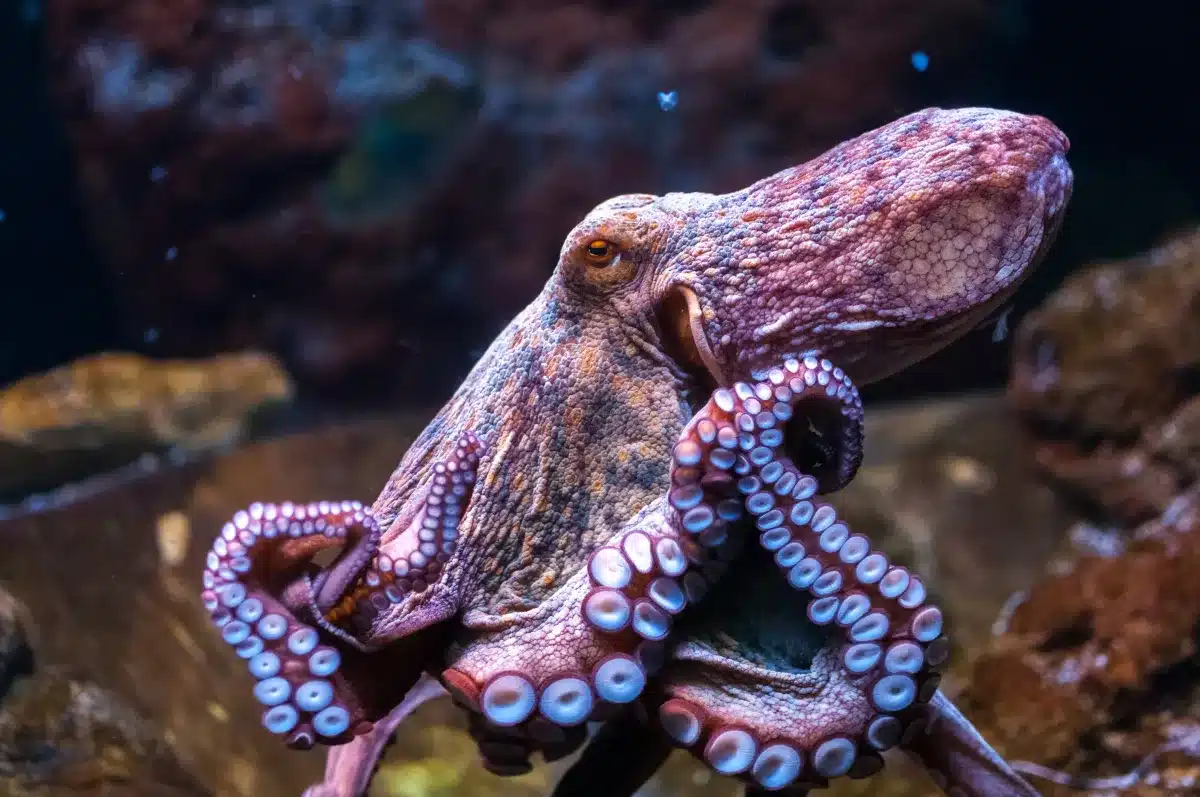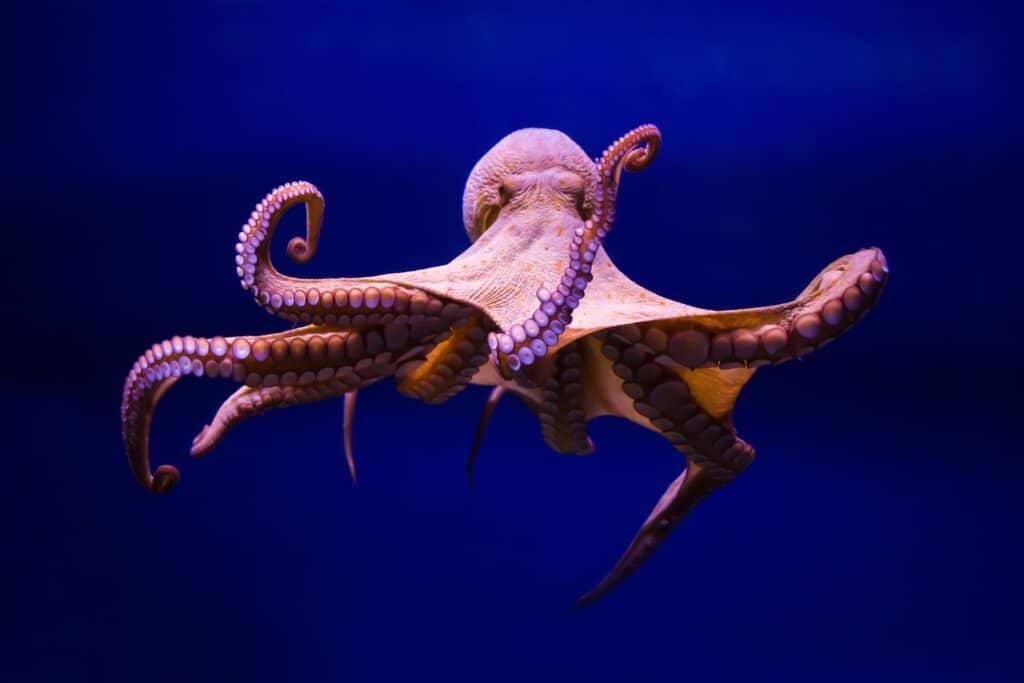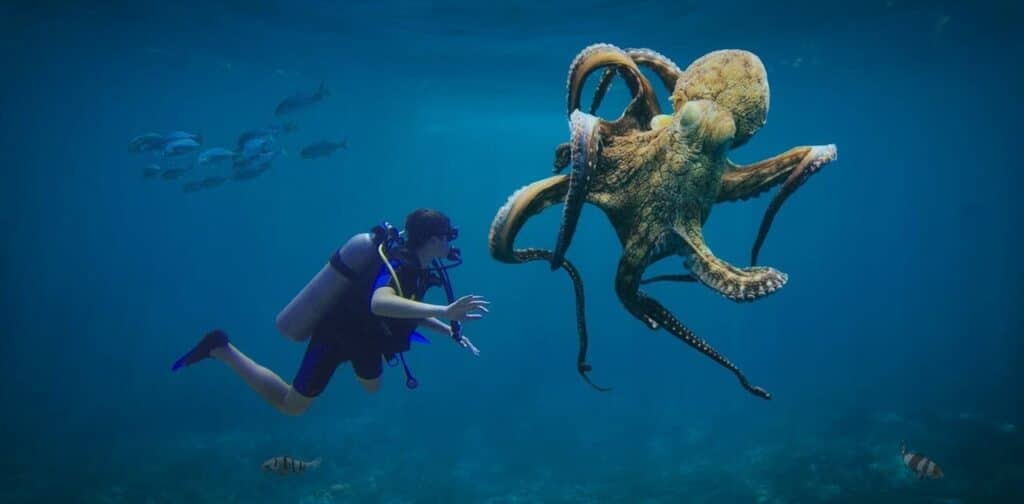Do Octopuses Have Feelings

Introduction
Do Octopuses Have Feelings: Octopuses, enigmatic and highly intelligent marine creatures, have long captured the curiosity of scientists and the public alike. While we readily recognize the emotional lives of mammals like dogs and dolphins, the emotional experiences of octopuses remain a subject of intense investigation and debate.
The question of whether octopuses have feelings is deeply rooted in our quest to understand the intricacies of animal consciousness. Unlike mammals, octopuses are cephalopods, belonging to a diverse and ancient group of mollusks that include squids and cuttlefish. Their unique physiology, with a decentralized nervous system and three-fifths of their neurons distributed throughout their tentacles, challenges traditional notions of what it means to be sentient.
Studies have revealed remarkable behaviors in octopuses lives, including problem-solving, tool use, and complex social interactions. These findings suggest a high level of cognitive sophistication, prompting questions about whether they might also experience emotions such as fear, curiosity, or even attachment.
Exploring the emotional lives of octopuses not only sheds light on their own mysterious world but also raises important ethical considerations regarding their treatment in captivity and in scientific research. This exploration is a journey into the depths of the sea and the depths of our understanding of consciousness, offering new perspectives on the emotional richness of the animal kingdom.

Can an octopus feel affection?
Invertebrates such as octopuses may experience other emotions such as curiosity in exploration, affection for individuals, or excitement in anticipation of a future reward.” It may be time to look at our world differently.
The question of whether an octopus can feel affection is a complex and intriguing one. While affection, as humans understand it, may not be the precise term to describe octopus emotions, there is evidence to suggest that these highly intelligent creatures form bonds and exhibit behaviors that resemble social attachments. Octopuses are known to display interactions with other octopuses, showing both aggression and more subtle forms of communication.
In some instances, octopuses have been observed engaging in what could be interpreted as protective or nurturing behaviors towards their eggs, guarding them vigilantly until they hatch. This behavior hints at a form of parental care that might involve a degree of emotional investment.
Octopuses have been observed interacting positively with humans in captivity, forming unique and individualized relationships with their human caregivers. While it’s essential to avoid anthropomorphizing their experiences, these interactions suggest a capacity for recognition and perhaps even a level of comfort around certain individuals.
In the absence of a common language of emotions between humans and octopuses, the depth and nature of their feelings remain a subject of ongoing scientific investigation and debate. Nonetheless, the complexity of their behavior hints at the possibility of emotional experiences that, while different from ours, are no less significant in the realm of octopus cognition and social dynamics.
How emotional are octopuses?
Using detailed measurements of spontaneous pain-associated behaviors and neural activity, Crook has identified three lines of evidence that all indicate octopuses are capable of feeling negative emotional states when confronted with pain.
The emotional depth of octopuses is a subject of both fascination and mystery in the world of animal behavior and cognition. While it is challenging to measure or understand their emotions through human-centric lenses, there is compelling evidence that octopuses possess a level of emotional complexity that defies conventional expectations.
Octopuses display behaviors that suggest emotional responses to various situations. For instance, they have been observed exhibiting signs of curiosity, playfulness, and fear, which could indicate the presence of emotions in their lives. Their ability to adapt to changing environments, solve intricate problems, and engage in complex social interactions further underscores their cognitive sophistication.
Additionally, octopuses demonstrate a capacity for learning, memory, and even problem-solving, behaviors often associated with the experience of emotions in animals. Their interactions with conspecifics, such as mating rituals and territorial disputes, hint at a realm of social dynamics that may involve emotional considerations.
While the precise nature and depth of their emotions remain elusive, the study of octopus behavior continues to shed light on the intricate tapestry of emotions in the animal kingdom, inviting us to appreciate the diversity of emotional experiences beyond our own human perspective.
Can octopuses love humans?
Octopuses are playful, resourceful, and inquisitive. Some species cuddle with one another, while others have been known to bond with humans. They are among the most highly evolved invertebrates and are considered by many biologists to be the most intelligent.
The notion of whether octopuses can experience love, particularly directed toward humans, is a captivating and complex topic. Love, as we typically define it, involves a range of deep emotions, attachment, and affection, which are largely rooted in human social and biological contexts. Therefore, applying the concept of love directly to octopuses requires caution.
Octopuses do exhibit a remarkable capacity for forming unique and individualized relationships with humans in captivity. Some octopuses appear to show a preference for certain human caregivers, displaying signs of recognition, curiosity, and even playfulness during interactions. These behaviors could be interpreted as a form of attachment or affection, albeit one that likely differs significantly from human romantic love.
It’s crucial to approach such observations with scientific rigor and acknowledge that octopus behavior stems from their unique evolutionary history and biology. Their interactions with humans may reflect a complex combination of curiosity, social intelligence, and a response to positive stimuli rather than a deep emotional connection in the way humans understand love.
While octopuses may form intriguing and seemingly affectionate relationships with humans, it is a stretch to assert that they experience love in the human sense. Instead, their interactions serve as a testament to the incredible adaptability and complexity of these fascinating marine creatures, highlighting the unique nature of interspecies connections.
Are octopuses emotionally intelligent?
Emotional Intelligence
On a personal level, caretakers say octopuses recognize them and seem to like some people more than others. And many people who work with them say they feel a powerful engagement when they interact with octopuses. Furthermore, octopuses have been shown to have forms of short and long-term memory.
Octopuses possess a form of emotional intelligence that is unique to their evolutionary path and ecological niche. While it may differ significantly from human emotional intelligence, it is evident that these remarkable cephalopods exhibit a high degree of cognitive and behavioral complexity in response to various emotional stimuli.
Their ability to adapt to a wide range of environments and display a rich spectrum of behaviors suggests a level of emotional acuity. Octopuses exhibit signs of curiosity, fear, aggression, and even playfulness, all of which point to a capacity for emotional responses to their surroundings and interactions.
Moreover, their exceptional problem-solving skills and ability to learn from experiences imply a form of emotional intelligence tied to memory and adaptation. Octopuses demonstrate an impressive memory of past events, which allows them to navigate their surroundings, recognize conspecifics, and even remember specific human caregivers.
Octopuses’ emotional intelligence is also evident in their intricate social behaviors, including complex mating rituals and territorial disputes. These interactions necessitate an understanding of the emotions and intentions of other octopuses.
While the emotional intelligence of octopuses may not align precisely with our human understanding, it underscores the astonishing diversity of cognitive and emotional abilities across the animal kingdom. It invites us to appreciate the nuanced ways in which different species, such as octopuses, navigate and respond to their worlds, highlighting the complex tapestry of emotions in the natural world.
What do octopuses feel like?
Octopuses feel slightly squishy, but also quite strong and muscley. They also feel velvety and slippery at the same time.
The tactile experience of touching an octopus is a unique and intriguing one. Octopuses are soft-bodied animals, and their skin is covered in a layer of specialized cells called chromatophores. These cells allow them to change the color and texture of their skin, providing them with remarkable camouflage abilities and a means of communication.
When you touch an octopus, you’ll encounter a smooth and somewhat gelatinous texture. Their skin can feel slippery due to the mucus they produce, which helps maintain moisture and streamline their bodies for efficient movement through water. The sensation is often described as cool and slightly moist, reminiscent of touching a damp rubber or silicone material.
What makes the experience truly remarkable is that octopuses can respond to touch in a surprisingly interactive way. They may use their suckers, which line their long, flexible arms, to explore and interact with objects or people they encounter. These suckers are incredibly sensitive and can grasp, manipulate, and even taste objects they come into contact with.
Interacting with an octopus can be a sensory adventure, as you may feel their arms gently wrapping around your hand or arm, exploring your skin with their suckers. It’s a testament to the adaptability and sensory richness of these incredible marine creatures, offering a tactile connection to the mysteries of the deep sea.
Can octopuses feel pain?
While they lack the same complex nervous system as vertebrates, recent studies suggest that octopuses possess a sophisticated network of neurons, granting them a remarkable level of intelligence and awareness. This neural complexity raises the possibility that they may experience some form of nociception, the biological mechanism underlying pain perception.
Evidence points to octopuses exhibiting behaviors indicative of discomfort or distress when exposed to noxious stimuli. They have been observed avoiding aversive conditions and even displaying protective measures around injured areas. Moreover, experiments have demonstrated that they can learn to associate painful experiences with specific cues, showcasing a capacity for pain memory.
Interpreting octopus behavior through a human-centric lens is a challenge, and the intricacies of their sensory experiences continue to be a topic of ongoing research. As we delve deeper into the enigmatic world of cephalopod cognition, the question of octopus pain perception prompts us to reconsider our treatment of these highly intelligent creatures, advocating for ethical practices in their care and handling.
Do octopuses form bonds or attachments with other octopuses or animals?
Octopuses, despite their solitary nature, exhibit intriguing social behaviors that hint at the potential for forming bonds or attachments. While they are not known for forming long-lasting relationships akin to mammals, they do engage in complex interactions with conspecifics, especially during mating and territorial disputes. Male octopuses, for instance, approach females with caution, engaging in intricate courtship displays that may involve color changes, posturing, and tactile interactions.
Interestingly, certain species of octopuses are known to be more gregarious than others. The Caribbean reef octopus, for example, can be found in loose aggregations, suggesting a level of social tolerance and cooperation. These gatherings are believed to serve as opportunities for mating and potentially offer protection against predators.
In terms of interspecies interactions, octopuses have been observed exhibiting curiosity or cautious interest towards other creatures, including humans. Some aquariums report instances of octopuses forming unique relationships with specific caretakers, displaying recognition and even seeking interaction. These behaviors suggest a capacity for recognition and individualized responses.
While the depth and longevity of these connections may not rival those seen in more social animals, the study of octopus social dynamics challenges our understanding of cephalopod cognition and the nature of interspecies relationships in the underwater world.
Do octopuses exhibit stress or anxiety?
While it’s challenging to interpret their emotions through a human lens, research suggests that octopuses do display behaviors indicative of stress responses. When subjected to stressful conditions, such as changes in environmental parameters or exposure to potential threats, octopuses exhibit a range of reactions.
These may include alterations in skin coloration, with some individuals adopting paler hues or displaying disruptive patterns. Agitated movements, such as jetting or rapid color changes, are also observed. In certain situations, octopuses have been known to engage in protective behaviors, like enclosing themselves in dens or using objects for camouflage.
Additionally, experiments have shown that octopuses can demonstrate learned aversion to specific stimuli associated with discomfort. This suggests a level of cognitive processing linked to stress recognition and avoidance.
While the depth of emotional experience in octopuses remains a subject of ongoing study, the evidence points towards a capacity for experiencing stress in response to adverse conditions. Understanding these responses not only informs our knowledge of cephalopod behavior but also prompts important ethical considerations in their care and conservation.

Conclusion
Our exploration into the emotional lives of these remarkable cephalopods has illuminated the incredible depth of their cognitive abilities and behaviors. While we cannot definitively answer whether octopuses experience feelings in the same way humans or mammals do, the evidence suggests that they possess a rich inner world that is vastly different from our own.
Octopuses’ ability to problem-solve, exhibit curiosity, engage in complex social interactions, and even display apparent preferences indicates a level of sentience that challenges our preconceptions about non-mammalian consciousness. These findings urge us to recognize the value and complexity of all life forms, regardless of their evolutionary lineage.
As we conclude our journey into the question of octopus emotions, we are compelled to consider the ethical implications. Respecting the emotional potential of these creatures is not only a matter of scientific interest but also a moral imperative. It underscores the need for responsible stewardship of marine environments and humane treatment of octopuses in captivity and research.
Ultimately, the question of whether octopuses have feelings reminds us of the boundless mysteries that still exist within the natural world. It beckons us to approach our fellow inhabitants of this planet with humility and empathy, fostering a deeper connection with the diverse array of life forms that share our Earth.



